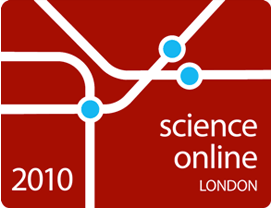So, I think it poses a great example of an academic community of discourse being conducted fluidly and fully online. I see general trends like this in the humanities, in education, in various fields, but working and completely scalable communities of discourse are a beauty to behold when they are running like an oiled machine. An organic, constantly evolving machine, but one nonetheless.
Curious to see what will become of this conference and hopefully some attendees can report back in. The network itself is greater than the sum of its parts.
via Academic Productivity by dario on 8/11/10
There is only a bunch of tickets left for one of the most exciting annual events in the area of ICT for science. Hosted by Mendeley, Nature and the British Library, the second edition of Science Online London (3-4 September 2010) promises to bring together hackers, academics, publishers and startups in the field of software/services for scientists to discuss “how the Web is changing the way we conduct, communicate, share, and evaluate research”. I will be attending and would love to meet other AcaProd readers there.

